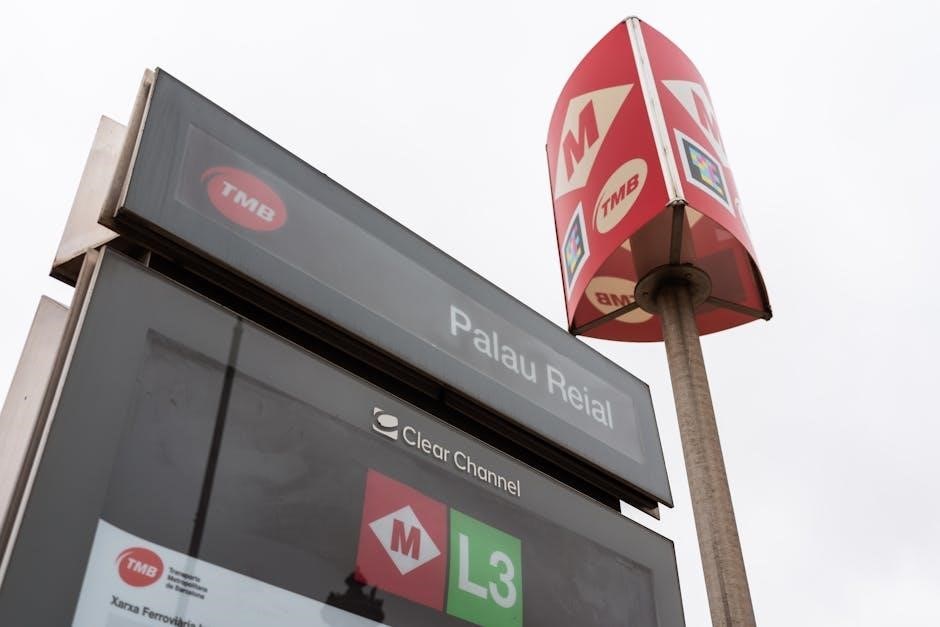Welcome to the Urban Consumers Guide, your go-to resource for navigating modern city living. From budgeting tips to smart shopping strategies, we cover essential topics like tech gadgets, financial planning, and travel to help urban dwellers make informed decisions effortlessly.
Importance of Urban Consumer Guides
Urban consumer guides play a pivotal role in empowering city dwellers to make informed decisions in their daily lives. With the rapid pace of urban living, consumers face numerous choices, from budgeting and shopping to technology and travel. These guides provide clarity by offering insights into spending patterns, such as those highlighted in the Consumer Price Index (CPI) for urban consumers, which tracks price changes for essential goods and services. By understanding these trends, urbanites can allocate their resources more effectively, ensuring they stretch their budgets further. Additionally, guides like the Urban Consumers Guide offer practical tips on smart shopping, whether online or in-store, and highlight the benefits of using coupons and discounts. They also cover tech essentials, such as the latest gadgets and smart home devices, helping consumers stay updated without overspending. Perhaps most importantly, these guides address broader financial planning, including investment basics and retirement strategies, enabling urban consumers to secure their futures. In a world filled with options, urban consumer guides serve as invaluable tools for navigating modern life with confidence and financial savvy.
How to Use This Guide
Navigating the complexities of urban living can be made simpler with this comprehensive guide. The Urban Consumers Guide is structured to address various aspects of city life, from budgeting and smart shopping to technology and travel. Each section is designed to provide actionable insights and practical tips tailored to the unique challenges and opportunities of urban environments. To make the most of this guide, start by identifying your specific needs. For instance, if managing expenses is a priority, explore the budgeting and expense management section. If you’re planning a trip, refer to the travel and leisure chapter for advice on planning affordable getaways and choosing the right accommodation. The guide also delves into financial planning, offering strategies for saving, investing, and retirement planning. By focusing on relevant sections, you can maximize the benefits of the guide and make informed decisions that enhance your urban lifestyle.

Budgeting and Expense Management
Urban living requires smart financial planning. Start by tracking expenses to identify spending patterns and create a realistic budget. Allocate funds wisely across housing, food, and entertainment to ensure sustainable urban living and long-term financial stability.
Creating a Realistic Budget
Creating a realistic budget is essential for effective financial management in urban environments. Start by tracking your income and expenses to understand your spending patterns. Categorize expenses based on the Consumer Price Index for All Urban Consumers (CPI-U), which includes housing, food, transportation, healthcare, and entertainment. Allocate funds according to priorities, ensuring essential needs are covered first. Use the 50/30/20 rule: 50% for necessities, 30% for discretionary spending, and 20% for saving and debt repayment. Regularly review and adjust your budget to account for inflation or changes in income. Consider using budgeting apps or spreadsheets for better tracking. Prioritize needs over wants and build an emergency fund to handle unexpected expenses. Stay informed about economic trends, like urban consumer inflation rates, to anticipate cost changes. By maintaining discipline and flexibility, you can create a budget that supports long-term financial stability and urban living goals.
Effective Expense Tracking
Effective expense tracking is crucial for maintaining financial stability in urban environments. Start by monitoring your income and expenses regularly, using tools like budgeting apps or spreadsheets. Categorize your spending based on the Consumer Price Index for All Urban Consumers (CPI-U) categories, such as housing, food, and transportation. This helps identify areas where costs can be optimized. Automate expense tracking by linking your bank accounts to financial management apps like Mint or You Need A Budget (YNAB). Set alerts for unusual transactions or overspending to stay on track. Regularly review your expense reports to understand trends and adjust your budget accordingly. By staying informed about inflation rates and urban consumer price trends, you can anticipate cost increases and plan your expenses more efficiently. Effective tracking not only helps in managing daily expenses but also enables long-term financial planning and goal achievement.
Saving Strategies
Saving money as an urban consumer requires a combination of discipline, awareness, and smart financial planning. Start by automating your savings through direct deposits or mobile banking apps like Mint or YNAB. Allocate a portion of your income to an emergency fund, aiming to save at least 3-6 months’ worth of living expenses. Take advantage of tax-advantaged accounts such as IRAs or 401(k)s for long-term savings goals. Stay informed about inflation rates and urban consumer price trends to anticipate cost increases and adjust your savings accordingly. Prioritize needs over wants, and avoid impulse purchases by creating a shopping list and sticking to it. For everyday expenses, consider using cashback apps or credit cards that offer rewards on essential purchases. Regularly review your budget to identify areas where you can cut costs and redirect those funds to your savings. By adopting these strategies, urban consumers can build a stable financial foundation and achieve their savings goals effectively.

Smart Shopping Strategies
Urban consumers can save by comparing prices, using coupons, and shopping during sales. Online platforms offer price trackers and cashback rewards, while in-store strategies like sticking to a list and avoiding impulse buys optimize spending. Plan wisely, shop smart, and maximize savings in the city!

Online Shopping Tips
Mastering online shopping is essential for urban consumers seeking convenience and savings. Start by comparing prices across multiple platforms using price comparison tools. Look for coupons, promo codes, and cashback offers to reduce costs. Reading reviews from other customers can help you make informed decisions. Additionally, consider subscribing to newsletters or following social media accounts for exclusive deals. Timing your purchases during holiday sales or special events can also yield significant discounts. To avoid overspending, stick to your shopping list and use features like price trackers to monitor items you want. Finally, take advantage of free shipping offers and bundle purchases to minimize delivery costs. By adopting these strategies, urban shoppers can enjoy a seamless and cost-effective online shopping experience while staying within their budgets.
In-Store Shopping Strategies
Maximizing efficiency in urban shopping requires strategic planning. Start by mapping out your shopping route to minimize travel time between stores. Utilize store locators or apps to identify nearby retailers and compare prices. Shopping during off-peak hours can enhance your experience, reducing wait times and crowds. Always check for in-store promotions, loyalty programs, and discounted sections to save money. Be mindful of product availability and consider alternative brands if needed. Purchasing in bulk may not always be practical for urban dwellers with limited storage space, so buy only what you need. Keeping a shopping list helps prevent impulse purchases and ensures you stay within your budget. Additionally, take advantage of in-store services like returns, exchanges, and expert advice from sales associates. By combining these strategies, urban consumers can optimize their in-store shopping experiences, saving time and money while making informed purchases.
Using Coupons and Discounts
Maximizing savings through coupons and discounts is a savvy strategy for urban consumers. Start by identifying reliable sources for coupons, such as store websites, email newsletters, and coupon apps like Honey or Rakuten. Physical coupons can still be found in newspapers, flyers, or through loyalty programs. Digital coupons, however, offer convenience and ease of use, often automatically applying at checkout. Always check expiration dates and terms to ensure validity. Combining coupons with in-store sales or seasonal promotions can amplify savings. For example, using a 10% discount on already reduced items can lead to significant price drops. Additionally, cashback apps like Ibotta or Fetch Rewards offer rebates on everyday purchases, further enhancing your savings. Remember, coupons are not limited to groceries; they can apply to clothing, electronics, and even services. By staying organized and proactive, urban consumers can effectively use coupons and discounts to stretch their budgets and enjoy more value for their money.

Technology and Gadgets
Stay ahead with the latest gadgets and smart home tech designed for urban living. Discover innovative devices like smartwatches, wireless earbuds, and voice assistants that enhance convenience and connectivity, making city life more efficient and enjoyable.
Latest Gadgets for Urban Living

Urban living demands gadgets that combine innovation, practicality, and style. One of the latest trends is portable air quality monitors, which help consumers track and improve indoor air quality in their homes. Another must-have is smart glasses with built-in augmented reality features, offering navigation, weather updates, and notifications at a glance.
Wireless earbuds with advanced noise-cancellation technology are also gaining popularity, perfect for commuting or working in noisy environments. Additionally, compact, high-capacity portable chargers are essential for keeping devices powered up on the go. These gadgets not only enhance convenience but also align with the fast-paced, connected lifestyle of urban dwellers.
For health-conscious city residents, wearable fitness trackers with heart rate monitoring and sleep analysis are indispensable. Smart home devices, such as voice-controlled lights and thermostats, further streamline daily routines. Staying updated with these gadgets ensures urban consumers can thrive in their dynamic surroundings.
Smart Home Technology Essentials
Smart home technology has become a cornerstone of modern urban living, offering convenience, efficiency, and enhanced security. Essential devices include smart thermostats, which optimize energy usage and regulate temperatures remotely, and smart lighting systems that adjust brightness and color based on the time of day or ambient conditions.

Smart security cameras and door locks provide peace of mind, allowing users to monitor their homes and grant access to guests or service providers remotely. Voice assistants like Amazon Alexa and Google Home integrate seamlessly with these devices, enabling voice commands to control multiple aspects of your living space.
Energy management systems are another key component, helping urban consumers track and reduce their utility consumption. These technologies not only simplify daily routines but also contribute to a more sustainable lifestyle. By investing in these smart home essentials, city dwellers can create a more connected, efficient, and enjoyable living environment.

Financial Planning and Savings
Effective financial planning is crucial for urban consumers to manage expenses and build wealth. Understanding CPI trends and budget allocations helps in creating realistic savings goals. Tailor strategies to suit individual needs, ensuring a balance between spending, saving, and investing for the future.
Investment Basics for Urbanites
Investing is a cornerstone of financial growth, especially for urban consumers navigating high-cost environments. Understanding basic investment principles can help urbanites build wealth and secure their financial futures. With the Consumer Price Index (CPI) influencing inflation rates and purchasing power, it’s crucial to align investments with economic trends. For urban dwellers, starting with low-risk options like index funds or ETFs can provide steady returns. Diversifying portfolios across stocks, bonds, and real estate helps mitigate risks. Urbanites should also consider retirement accounts such as 401(k)s or IRAs to maximize tax benefits. Automating investments through monthly contributions can make saving and growing wealth more manageable. Additionally, staying informed about market trends and seeking advice from financial professionals can empower urban consumers to make informed decisions. By adopting disciplined investment habits, urbanites can effectively grow their wealth and achieve long-term financial stability.
Retirement Planning Strategies
Retirement planning is a critical aspect of long-term financial security, especially for urban consumers facing unique financial challenges. Given the rising cost of living in cities, urbanites must adopt strategic approaches to ensure a comfortable retirement. Understanding the impact of inflation, as reflected in the Consumer Price Index (CPI), is essential for planning. Urban consumers should prioritize contributing to employer-sponsored retirement plans, such as 401(k)s, and take full advantage of any employer match. Additionally, individual retirement accounts (IRAs) offer flexibility and tax benefits for those without access to workplace plans. Diversifying retirement portfolios across stocks, bonds, and real estate can help mitigate risks and ensure steady income streams. Automating savings through monthly contributions can make retirement planning more manageable. Urbanites should also consider consulting financial advisors to tailor strategies to their specific needs. Regularly reviewing and adjusting retirement goals ensures alignment with changing life circumstances. By adopting disciplined savings habits and leveraging available resources, urban consumers can build a secure financial foundation for their golden years.

Travel and Leisure
Discover how to plan affordable urban getaways and make the most of your city stays. Explore tips for choosing the right accommodation, maximizing local experiences, and enjoying cultural highlights without overspending. Your guide to smart, enjoyable urban travel awaits!
Planning Affordable Urban Getaways
Planning an affordable urban getaway requires strategic thinking and research. Start by identifying off-peak travel times to secure lower prices for flights, hotels, and attractions. Consider alternative destinations or nearby cities with similar charm but lower costs. Use public transportation or walk/bike whenever possible to save on rental cars and parking fees.
- Book accommodations in central neighborhoods to minimize travel expenses and enjoy easy access to key attractions.
- Research free or low-cost activities, such as visiting local parks, museums on free admission days, or exploring street markets.
- Plan meals wisely by dining at local eateries or food trucks instead of upscale restaurants.
- Take advantage of city passes or bundled attraction tickets to save on individual entry fees.
Additionally, use travel apps and websites to compare prices and find last-minute deals. Always read reviews to ensure quality and safety. By combining these strategies, you can enjoy a fulfilling urban getaway without breaking the bank. Start planning your next adventure today!
Choosing the Right Accommodation
Selecting the perfect place to stay is crucial for a seamless urban experience. Start by evaluating your budget and preferences to narrow down options. Consider proximity to key attractions, public transport, and safety of the neighborhood. Research reviews and ratings from trusted sources to gauge the quality and reliability of accommodations.

- Compare prices across hotels, hostels, and vacation rentals to find the best value for your money.
- Check for amenities that align with your needs, such as free Wi-Fi, breakfast options, or fitness centers.
- Verify the cancellation policies and hidden fees to avoid unexpected costs.
- Book in advance during peak travel seasons to secure better rates and availability.
For longer stays, consider renting an apartment to save on daily rates and enjoy more space. If you’re traveling solo or on a tight budget, hostels can offer affordable and social environments. Always prioritize cleanliness, safety, and convenience to ensure a comfortable stay. By doing your homework, you can find the ideal accommodation that fits your lifestyle and budget.

